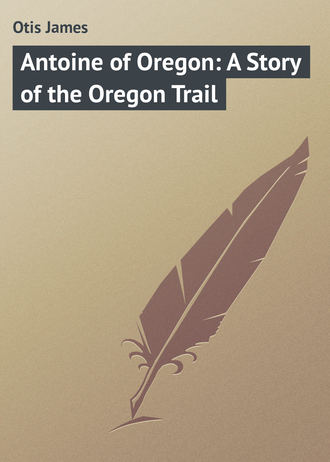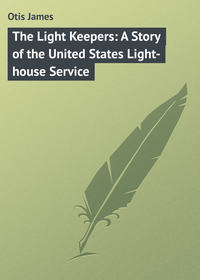 полная версия
полная версияAntoine of Oregon: A Story of the Oregon Trail

James Otis
Antoine of Oregon: A Story of the Oregon Trail
The author of this series of stories for children has endeavored simply to show why and how the descendants of the early colonists fought their way through the wilderness in search of new homes. The several narratives deal with the struggles of those adventurous people who forced their way westward, ever westward, whether in hope of gain or in answer to "the call of the wild," and who, in so doing, wrote their names with their blood across this country of ours from the Ohio to the Columbia.
To excite in the hearts of the young people of this land a desire to know more regarding the building up of this great nation, and at the same time to entertain in such a manner as may stimulate to noble deeds, is the real aim of these stories. In them there is nothing of romance, but only a careful, truthful record of the part played by children in the great battles with those forces, human as well as natural, which, for so long a time, held a vast portion of this broad land against the advance of home seekers.
With the knowledge of what has been done by our own people in our own land, surely there is no reason why one should resort to fiction in order to depict scenes of heroism, daring, and sublime disregard of suffering in nearly every form.
JAMES OTIS.THE FUR TRADERS
There is ever much pride in my heart when I hear it said that all the trails leading from the Missouri River into the Great West were pointed out to the white people by fur buyers, for my father was well known, and in a friendly way, as one of the most successful of the free traders who had their headquarters at St. Louis.
It is not for me to say, nor for you to believe, that the fur traders were really the first to travel over these trails, for, as a matter of fact, they were marked out in the early days by the countless numbers of buffaloes, deer, and other animals that always took the most direct road from their feeding places to where water could be found.
Then came the Indians, seeking a trail from one part of the country to another, and they followed in the footsteps of the animals, knowing full well that thereby they would not lack for water, the one thing needful to those who go to and fro in the wilderness.
Thus it was that the animals and the Indians combined to mark out the most direct roads that could be made, with due regard to the bodily needs of those who traveled from one part of the Great West to another.
As the traders in furs journeyed from tribe to tribe of the Indians, or sought the most favored places for trapping, they learned how white men could go westward from the Missouri River to the Pacific Ocean without fear of dying from hunger or thirst.
My father, Pierre Laclede, was, as I have said, a free trader, which means that he went out into the wilderness with his crew of boatmen and trappers, free from any bargains or duties to the great fur trading companies, such as the Hudson's Bay, the Northwest, and the X. Y.
There were regular battles fought between the hunters and trappers of these great companies in the olden days, when St. Louis was under Spanish rule and had become a famous gathering place for the fur traders.
There were many like my father, who, hiring men to help them, carried into the wilderness goods to be exchanged with the Indians for furs, and, failing in this, set about trapping fur-bearing animals throughout the winter season.
Wonderful sport these same traders had, as I know full well, having been more than once with my father over that trail leading from the Missouri River to the Oregon country.
Then there was the home-coming to St. Louis, when every man forgot the days on which he had been cold or hungry, and no longer heeded the half-healed wounds received in Indian attacks, when he had been forced to defend with his life the furs he had gathered.
Once in St. Louis, what rare times of feasting and making merry, while the furs were being shipped to New Orleans, or bartered to the big companies that were ever on the watch for the return of the free traders!
WHY I AM NOT A FUR TRADER
I, Antoine Laclede, would have followed in the footsteps of my father, becoming myself a free trader after the treacherous Blackfeet Indians killed him, had it not been that my mother, with her arms around my neck, pleaded that I remain at home with her.
Therefore, instead of carrying on my father's business as a lad of fifteen should have done, I strove to content myself at St. Louis, to the pleasure of my dear mother.
However much affection there might be between us, it remained that we must be supplied with food, and that my mother should have the things necessary for her comfort.
But if I did not take up my father's business after he had lost, with his life, the store of furs which he had been eight months in gathering, as well as what remained of the goods he had carried into the wilderness for trading, then how could I rightly fill the position as head of the family, when all I had in this world were my two hands and the desire to make my mother happy?
We lived on a street near the old cathedral, and it may be that our small home was not the most pleasing to look upon of all the houses in St. Louis; but in it I was born. My father had built it, paying for every timber with furs he had gathered at risk of his life, and I would not have yielded it in exchange for the finest house in the land.
The evil days fell upon us, meaning my mother and me, very shortly after the news of my father's murder was brought to St. Louis, for we soon came to know that we had neither goods nor furs enough to keep us one full year.
STRIVING TO PLAN FOR THE FUTURE
Then it was that I went out one day alone to the river bank, where I might have solitude and think how I could care for my mother as the only son of a widow should care for that person whom he most loves.
I had lived fifteen years. There was no trapper in the Northwest Company who could take more furs than I could. To ride and shoot were my pleasures, and my unhappiness was in being forced to set down words with a pen, or to puzzle my poor brain over long rows of figures which must have been invented only for the sorrow of Antoine Laclede.
My rifle and Napoleon, a small spotted pony that could outkick any beast this side the Rocky Mountains, made up all I owned of value, and yet with them I must earn enough to support my mother and make her comfortable.
The truth is, I might have joined with some free trader who had known my father, working for a small wage, which would not be more than enough to supply my mother with food and clothes such as had been provided by my father; but I must earn more than that, lest the day should come when, from wounds or sickness, I could not hold up my end with my companions on the trail or with the traps.
All this made my heart heavy as I sat there on the river bank asking myself what there was a lad like me could do.
Just at that time, when I was most downhearted, a man, tall of stature and spare in flesh, came up close beside me, and, as it seemed, looked down with much mirth in his heart, perhaps because I carried such a woebegone expression on my face.
AN INQUISITIVE STRANGER
Then, much to my surprise, he said, speaking in what seemed an odd tone, much as though he had a cold in his head: —
"Are you the son of Laclede, the free trader who was killed by the Blackfeet Indians not so long ago?"
I was ever proud to own that I was my father's son, and speedily gave the stranger an answer, although at the same time asking myself whether there was any good reason for such a question, or if he was intending to make sport of me.
"I am told that you have been over the trail 'twixt here and the Oregon country with your father, lad?"
"I have been twice into the land of the Walla Wallas, but no farther than that, although it would have pleased me well could I have seen the great ocean."
"Now I am not so certain where the country of what you call the Walla Wallas may be," the man said with a puzzled expression upon his face, whereupon I answered quickly, proud because of being able to tell: —
"It is this side the Cascade Range, the other side of the Blue Mountains, near where the Columbia River takes a sharp turn to the westward."
"The Columbia River, eh?" the man repeated, as if satisfied with my reply. "Then you surely must have traveled near to the Pacific Ocean?"
"I have been so near that one might go down the river to it in a canoe, if he were so disposed; but there is a station of the Hudson's Bay Company near the coast and we free traders who deal with the Northwest Company have no desire for traffic with those who would shut us out from St. Louis, fearing lest we may cut into their trade."
AN UNEXPECTED PROPOSITION
The man seated himself by my side as if satisfied that I was the one whom he sought, and began his business by saying: —
"My name is John Mitchell. I am at the head of a party of thirty men, women, and children who are bound for the Oregon country. We are taking with us forty head of oxen, twenty horses, ten mules, and thirty cows, to say nothing of the remainder of the outfit. I counted on meeting here at St. Louis a man who would guide us across, but find that he has left us in the lurch, likely because of getting a better offer from some other company of settlers. Now I have been told that you could serve us as guide; that you are what may be called a fairly good hunter; and, although you look a bit too young for the business, there are those here in St. Louis who say you may be depended upon. What about guiding my party across? We are willing to pay considerably more than fair wages – "
"It may not be for me to do any such thing," I replied quickly, although at the same time wishing I could go once more into the Oregon country and do a man's work as guide. "I have here my mother, who has no other to depend upon, and I must stand by her, as a son should."
"Well said, lad, well said. It does you credit to think first of your mother; but we are willing to pay considerable money to one who can guide us, because this kind of traveling is new to all my party. Already in coming up from Indiana we have had trouble with the cattle and with the teams. Now say three hundred dollars for the trip, and if you are minded to take your mother with you we stand ready to let her share in whatsoever we have."
There is no reason why I should set down all we said, for we sat there on the river bank until an hour had passed, talking all the while.
Each moment I grew more and more eager for the adventure, until it seemed to me I had never had but one desire in life, and that to go into the Oregon country and make there a home for my mother.
I promised to meet the man again that evening and went straight away home to lay the matter before my mother. It surprised me not a little that she seemed to be in favor of going to the Oregon country, and I have since been led to believe that her willingness to abandon the home in St. Louis came from the wish to make a change and to leave that place where everything must needs remind her of my father.
I SET OUT AS A GUIDE
Before seeking out John Mitchell, whose company was encamped on the opposite side of the river, I visited a neighbor who had once offered to buy our home. With him I agreed that for a certain sum of money he should take possession of the house, using it as his own until my mother and I came back, or, in case we remained in the Oregon country, then he was to pay us as many dollars as we agreed upon.
That afternoon, an hour before sunset, I paddled across the river to where John Mitchell's company was encamped, and for the first time I questioned whether it might be possible for me, a lad only fifteen years of age, to guide all these people, who seemingly had no more idea of what was to be encountered in a journey to the Oregon country, than if they had never heard of such a place.
I dare venture to say there could not have been found in St. Louis a lad over ten years old who would have shown so much ignorance in forming a camp, as did John Mitchell, who held himself commander of the company.
True, there was no reason why they need guard themselves as if in the country of an enemy. Yet if they were careless at the start, heeding not the common precautions against the stampeding of their cattle, or the possibility that prowling Indians might steal whatever lay carelessly around, then surely when in a place where danger lurked, they could not be depended upon to care for themselves in a sensible manner.
Somewhat of this I said to John Mitchell while looking around the encampment, and that he himself was ignorant of what might be met with on a journey to the Oregon country, was shown when he asked: —
"And are you reckoning, lad, that we may come upon much danger?"
"Ay, sir, and plenty of it," I replied. "Just now the Indians are quiet, so I have heard it said by the traders; but even when there is no disturbance of any account, you are likely to come upon roving bands that will make trouble. Even though they may do no worse, you can set it down as a fact that from the time of leaving the settlement of Independence, where the journey really begins, until you have come into the Walla Walla country, there will be hardly a day, or, I should say, a night, when you are not in danger of losing your stock through these red thieves."
JOHN MITCHELL'S OUTFIT
There was one thing in favor of John Mitchell, as I looked at the matter, which was that his outfit was most complete. He had five well-made carts with straight bodies, and sideboards from fourteen to sixteen inches wide running outward four or five inches; in other words, what are called "Mormon wagons," and to three of these he counted on putting four yoke of cattle apiece. I was not so well satisfied with this, for the beasts had been raised in Indiana, and therefore were not accustomed to eating prairie grass, which would be the greater portion of their food during the journey.
I had always heard it said that Illinois or Missouri cattle could stand the journey to the Oregon country better than any others, although then I did not know it from my own experience.
The ten mules were to be used for the hauling of the two remaining wagons. To one of these would be harnessed six of the animals, and the other, in which many of the women and children were to ride, was to be drawn by four. The horses were to be used under the saddle.
I was forced to admit that Mitchell had not been niggardly in outfitting his company.
He had no less than five sheet-iron stoves with boilers, one being carried on a small platform at the rear end of each wagon. There were tents in abundance for all the company, while for cooking utensils, there were plates and cups and basins of tinware, half a dozen or more churns, an ample supply of water kegs, and farming tools almost without number.
I had little or no interest in this part of the outfit, but took good care to make certain there were ropes and hobble straps in plenty for tying up the horses and fettering those that were likely to stray, because I knew from experience how much of such supplies might be lost or stolen during the long journey.
The weapons carried by the men were of heavier caliber than I would have suggested, unless they counted on using them wholly for buffalo shooting. John Mitchell took no little pride in showing me his rifled gun which carried thirty-two bullets to the pound, when to my mind fifty-six would have served him better for general work; but that was really no concern of mine.
MAKING THE BARGAIN
We talked over the matter fairly and at great length, all the men of the company and some of the women taking part in the parley. The bargain, as I understood it, was that I was hired for no other service than to guide this company, and also to make suggestions as to the best places for camping, as well as how we could keep the people supplied with fresh meat.
It was agreed that my mother should ride in the four-mule wagon with John Mitchell's family, which consisted of his wife, a girl about my own age by name of Susan, and three awkward-looking boys. The oldest of these lads was not more than ten, I should think, and all of them were so clumsy that it seemed almost impossible for them to avoid treading on their own feet. About mounting a horse or rounding up cattle, they knew no more than my Napoleon knew about good manners.
Susan, however, was a sprightly girl, who, as it seemed to me, had more good sense in her little finger than might be found in all the rest of the family. Before my visit was at an end, she came to ask concerning this or that which we might meet with on the way, and I believed I had found one who would be a most desirable comrade.
Unless I mistook her entirely, she was a girl to be depended upon in the time of trouble, and when one would travel from the Missouri River to the Oregon country, it is of the greatest importance to have with him only those who can be relied on to a certainty when danger lurks at hand, as it surely does, so I have heard my father say, from the time the voyager leaves the Kansas River until he has come to the Columbia.
It was agreed that my mother and I should have a day in which to make ready for this journey, which, if we met with no serious mishaps, would require not less than five months to make; therefore it can well be understood that we had little time to spend in sleep, if we would present ourselves to John Mitchell at the hour agreed upon.
It is my desire never to make a promise which I do not, or cannot keep; consequently there were many things left undone in St. Louis when mother and I crossed the river; but it was better thus than that I should disappoint ever so slightly those with whom I had made a positive agreement.
WE LEAVE ST. LOUIS
In order that one may the better understand how much of a journey it is from the Missouri River to the Oregon country, I set down here the fact that at eleven o'clock in the forenoon, on the twenty-fifth day of April, in the year 1845, we, meaning John Mitchell's company, my mother, and I, set off on that long march. The real journey would not begin until we had passed that settlement on the Missouri known as Independence, which is the point of departure for those who count on traversing the Oregon or the Santa Fe trail.
Therefore concerning this portion of our march I shall content myself simply with saying that we arrived at Independence on the morning of May 6th, and made camp two miles beyond, on the bank of a small creek, where there was plenty of grass for the cattle.
It must be understood that up to this time we had been traveling through one settlement and another in a portion of the country where were to be found as many people as lived, mayhap, in the neighborhood from which John Mitchell had come. Yet so awkward were the men and boys, that while we were traversing beaten roads they found it exceedingly difficult to keep the cows from straying or the oxen from stampeding even while they were yoked and hitched to the heavy wagons.
I do not claim to have had any experience at driving oxen or herding cattle, and therefore I held myself aloof, saying it were better these people from Indiana should learn their lesson when there were but few difficulties in the way and no dangers, so that after we should come where the real labor began, they might at least have some slight idea of what was expected of them.
THE HARDSHIPS TO BE ENCOUNTERED
But for the fact that Susan Mitchell, riding upon a small black, wiry-looking horse, held herself well by my side, I would have been disheartened even before we had really begun the journey, because I was looking forward to what we must encounter, and saying to myself that unless these people could pull themselves together in better fashion, we were certain to come to grief.
When a company fails to herd thirty cows, over what might well be called a beaten highway, what would you expect when in a country where the Indians are doing all they can to stampede and run off cattle as well as horses?
I soon saw that Susan was a girl of good understanding, for without a word having been spoken, she seemed to realize those fears which had come into my mind, and said again and again as if to strengthen my courage: —
"They will know more about this kind of traveling when we reach Independence."
I could not refrain from saying in reply that unless they learned more speedily it would be well we waited a full year at Independence, rather than attempt a journey where so much danger and hardship awaited us.
I venture to say that there was not one among John Mitchell's company who could have put a pack upon a horse in such a manner that it would hold in place half an hour over rough traveling; and as for handling a mule team, the driver of that wagon in which my mother rode had no more idea of how the beasts should be treated than if he had so many sheep in harness.
To show how ignorant these people were regarding the country, I have only to say that from the moment we left St. Louis one or another was continually asking me whether we were likely to come upon buffaloes before the night had set. The idea of buffaloes between St. Louis and Independence, save perchance we came upon some old bull that had been driven away from the herd by the hunters!
It was by my advice that John Mitchell decided to overhaul his outfit at Independence in order to learn whether there might be anything needed, for after having left the settlement we would find no opportunity of replenishing our stores save at some one of the forts, and then it was a question, serious indeed, whether we could get what might be needed.
THE CAMP AT INDEPENDENCE
The tents were hardly more than set up, and the women had but just got about their cooking, for the breakfast had been a hasty meal owing to our being so near the settlement, when we were visited by a dozen or more Kansas Indians, who are about as disreputable a looking lot as can be found in the country – dirty, ill-favored red men with ragged blankets cast about them, and seeming more like beggars than anything else.
To tell the truth, I would rather have seen around the camp a Blackfoot, a Cheyenne, or a Sioux, knowing that any of them would murder me if he had a fair opportunity, than those beggarly Kansas savages.
It was the first time any of the women of our company, save my mother, had seen an Indian near his own village, and straightway all of them, with the exception of Susan, were in a panic of fear, believing harm would be done.
Even John Mitchell was undecided as to how he should treat them, until I told him that any attempt to drive the creatures away would be useless, and that if his people were so disposed they might give them some food; but it was in the highest degree necessary that sharp watch be kept, else we would find much of our outfit missing after the visitors had taken their departure.
The men and the boys of our company were so disquieted because of having come thus suddenly upon the Indians, that they kept good watch over the camp during this first day, and it would have been well for all of us if they had continued to stand as honest guard over their belongings.
It was found that we were needing extra bows for the wagons, meaning those bent hoops over which the canvas covering is stretched, that the supply of shoes for the horses and mules was not sufficient, and, in fact, there were half a hundred little things required which the women believed necessary to their comfort.
Therefore John Mitchell and I went into the settlement to get what was wanted, and, like the good comrade she gave promise of being, Susan insisted on going with us.
A FRONTIER TOWN
Independence was much like a trading post, save that there were no blockhouses; but the log tavern had the appearance of a building put up to resist an attack, and the brick houses surrounding it were made with heavy walls in which were more than one loophole for defense.











